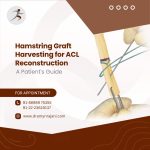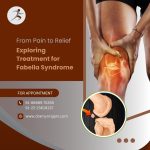Knee injuries are common, particularly among athletes and active individuals. One of the most frequent knee injuries is a meniscus tear, which can cause significant pain and limit mobility. For many patients, knee arthroscopy is the preferred method for diagnosing and treating meniscus tears. This minimally invasive surgical procedure offers numerous benefits, including faster recovery times and reduced post-operative pain. In this article, we’ll explore the details of knee arthroscopy for meniscus tears, why it’s a preferred treatment, and how to choose the right arthroscopy specialist in Mumbai.
Understanding Meniscus Tears
The meniscus is a C-shaped piece of cartilage in the knee that acts as a shock absorber between the thighbone (femur) and the shinbone (tibia). Each knee has two menisci—one on the inner side (medial) and one on the outer side (lateral). The menisci help distribute body weight across the knee joint and provide stability during movement.
A meniscus tear can occur due to sudden twisting or turning of the knee, particularly when the foot is planted on the ground. This type of injury is common in sports such as football, basketball, and tennis. Meniscus tears can also occur as a result of aging, where the cartilage weakens and becomes more susceptible to injury.
Symptoms of a meniscus tear include:
- Knee pain, particularly along the joint line
- Swelling and stiffness
- Difficulty bending and straightening the knee
- A popping sensation at the time of injury
- Locking or catching of the knee joint
What is Knee Arthroscopy?
Knee arthroscopy is a minimally invasive surgical procedure used to diagnose and treat problems within the knee joint. During the procedure, an arthroscopic surgeon in Mumbai makes small incisions around the knee and inserts an arthroscope—a thin, flexible tube with a camera and light attached to it. The arthroscope transmits images of the inside of the knee to a monitor, allowing the surgeon to view the joint in real-time.
If the surgeon identifies a meniscus tear or other issues, specialized surgical instruments can be inserted through additional small incisions to repair or remove the damaged tissue. Knee arthroscopy is typically performed under general or regional anesthesia, and the entire procedure usually takes about 30 to 60 minutes, depending on the complexity of the injury.
Advantages of Knee Arthroscopy for Meniscus Tears
Knee arthroscopy offers several advantages over traditional open surgery, making it a preferred option for treating meniscus tears:
- Minimally Invasive: Knee arthroscopy involves only small incisions, which reduces the risk of infection, minimizes scarring, and leads to quicker healing.
- Faster Recovery: Patients who undergo knee arthroscopy typically experience a faster recovery compared to those who undergo open surgery. Most patients can return to their normal activities within a few weeks, depending on the extent of the tear and the repair performed.
- Reduced Pain: The smaller incisions and less invasive nature of arthroscopy result in less post-operative pain. Patients often require fewer pain medications and can begin physical therapy sooner.
- Accurate Diagnosis: The use of an arthroscope allows the surgeon to get a clear, detailed view of the inside of the knee joint, leading to a more accurate diagnosis and effective treatment.
- Outpatient Procedure: Knee arthroscopy is usually performed as an outpatient procedure, meaning patients can go home the same day and begin their recovery in the comfort of their own home.
- Less Trauma to Surrounding Tissues: Because arthroscopy is less invasive, there is less trauma to the surrounding muscles and tissues, which contributes to a quicker and smoother recovery process.
Treatment Options During Knee Arthroscopy
Depending on the severity and location of the meniscus tear, there are different treatment options that an arthroscopic surgeon in Mumbai may consider during the procedure:
- Meniscus Repair: If the tear is located in an area of the meniscus with a good blood supply (usually the outer edge), the surgeon may repair the tear using sutures. Meniscus repair is often preferred for younger patients or those with active lifestyles, as it preserves the meniscus and its shock-absorbing function.
- Partial Meniscectomy: In cases where the tear is in an area with poor blood supply or if the tissue is severely damaged, the surgeon may remove the torn portion of the meniscus. This is known as a partial meniscectomy. The remaining healthy tissue is preserved to maintain as much of the meniscus's function as possible.
- Total Meniscectomy: In rare cases, if the entire meniscus is severely damaged, the surgeon may need to remove the entire meniscus. However, this option is typically avoided as it can lead to long-term issues such as osteoarthritis.
Recovery and Rehabilitation
Recovery from knee arthroscopy for a meniscus tear varies depending on the type of treatment performed and the patient’s overall health. Here’s what to expect during the recovery process:
- Immediate Post-Operative Care: After the surgery, the knee will be wrapped in a bandage, and patients may need to use crutches for a few days to avoid putting weight on the affected leg. Ice and elevation can help reduce swelling and pain in the initial days following the procedure.
- Physical Therapy: Physical therapy is a crucial component of recovery. An orthopaedic doctor in Mumbai will likely recommend a personalized rehabilitation program that includes exercises to restore strength, flexibility, and range of motion in the knee. Physical therapy typically begins within a few days to a week after surgery.
- Return to Activity: Most patients can return to light activities within 2 to 4 weeks and more strenuous activities, including sports, within 3 to 6 months. However, the timeline may vary depending on the extent of the surgery and the patient’s adherence to the rehabilitation program.
- Follow-Up Visits: Regular follow-up visits with the surgeon are essential to monitor the healing process and ensure that the knee is recovering properly.
Choosing the Right Arthroscopy Specialist in Mumbai
Selecting the right arthroscopy specialist in Mumbai is critical to achieving a successful outcome. Look for a surgeon with extensive experience in knee arthroscopy and a proven track record of treating meniscus tears. It’s important to choose a specialist who stays updated with the latest advancements in arthroscopic techniques and who takes the time
to explain the procedure, risks, and benefits to you.
Dr. Amyn Rajani: Leading Arthroscopic Surgeon in Mumbai
Dr. Amyn Rajani is a renowned Consultant Knee, Shoulder, and Hip Surgeon with extensive expertise in arthroscopic surgery. As one of the leading arthroscopic surgeons in Mumbai, Dr. Rajani has successfully performed numerous knee arthroscopies for meniscus tears, helping patients return to their active lifestyles with minimal downtime. His patient-centered approach and commitment to using the latest surgical techniques ensure optimal outcomes for his patients. If you’re considering knee arthroscopy, consult with Dr. Amyn Rajani to receive expert care from a highly skilled orthopaedic doctor in Mumbai.
For more information or to book a consultation with Dr. Amyn Rajani, visit OAKS clinic at Hughes Road, Mumbai or website www.dramynrajani.com or simply call on Clinic Number 91-88989 75355 / 91-22-23619137 to take the first step towards a pain-free future.




